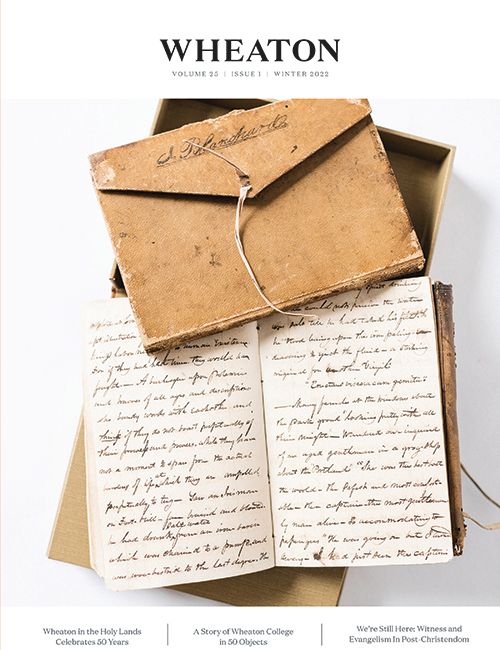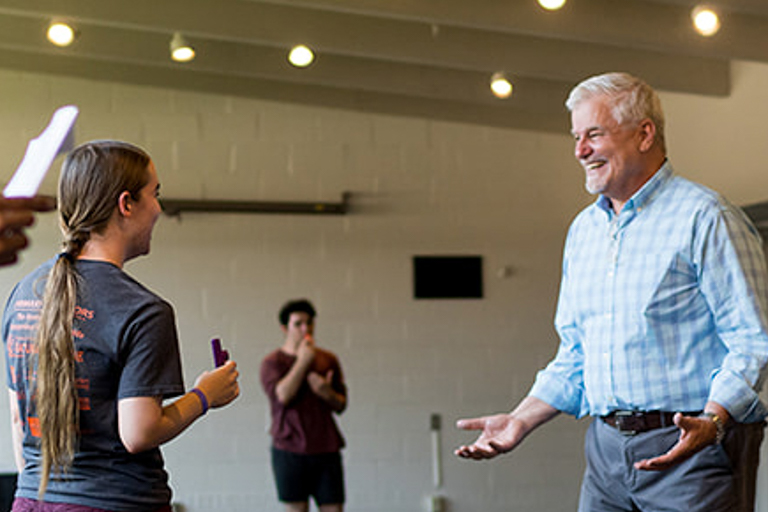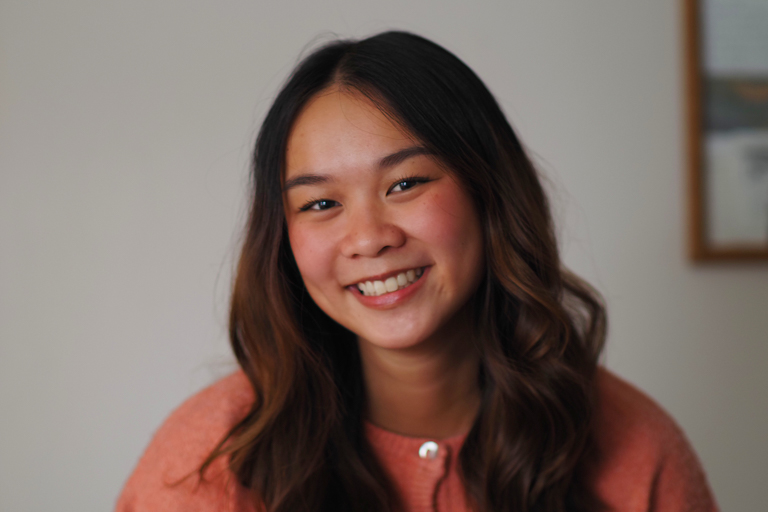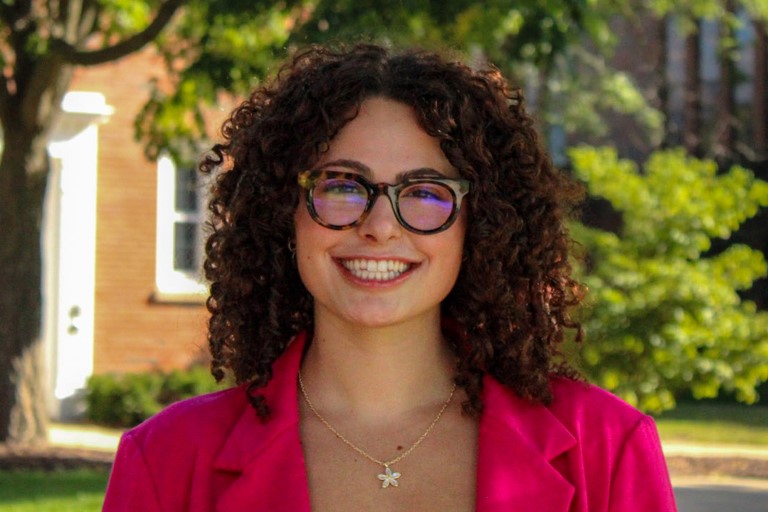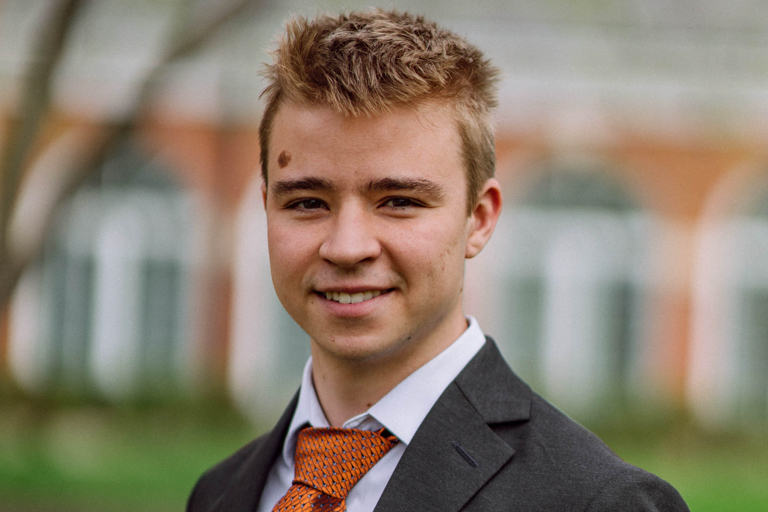Innovation to Bless
How the iLab at Wheaton’s Center for Faith and Innovation uses Christian Community and Diversity of Critical Thought to Solve Real-World Business Problems
Words: Jenna Watson ’21
Photos: Wheaton Center for Faith and Innovation
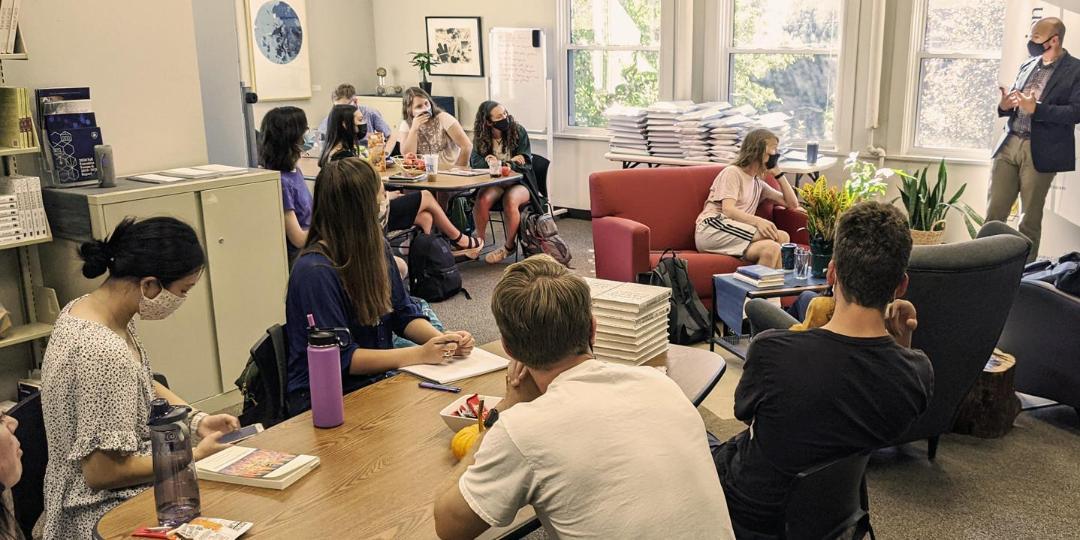
Innovation Scholars hear from Dr. Keith Johnson, Professor of Theology at Wheaton College and Director of Theological Integration at CFI
A STEM student, a painter, an English major, and a psychologist walk into an office. The start of a joke? No; the site of the iLab at Wheaton’s Center for Faith and Innovation (CFI).
While interdisciplinary learning is central to every Wheaton education, the iLab at CFI allows students to take it a step further and apply their learning to real-world business problems. Consulting teams of students across disciplines, CFI faculty, and marketplace experts collaborate to solve complex business problems that CFI partner organizations face. Let’s join one of the teams on a field trip to see what it’s all about.
A New Zip Code for Lynwood
It’s a blustery Thursday in November. The Urban Outreach iLab team is gathered outside the Village Hall of Lynwood, a Chicago suburb just miles from the Indiana border, after a meeting with the mayor.
Inside the brick building just minutes before, the team learned from mayor Jada Curry and the Board of Trustees about some of the complex economic challenges facing Lynwood. “The current zip code,” team leader Emma Green ’23 explained, “is shared by Chicago Heights, Ford Heights, Sauk Village, and Lynwood.” However, there is great economic variation across these villages, so sharing a zip code causes problems for Lynwood residents related to automobile insurance rates, housing values, and sales tax revenue. A new zip code would also mean less confusion for residents about where to go for municipal elections, Emma explained, and may even bring faster emergency service from 911 calls. That’s real, life-saving change.
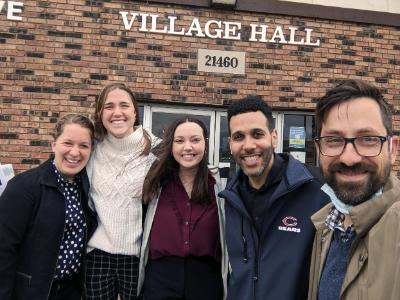
The Urban Outreach iLab Team outside Lynwood Village Hall after meeting with the mayor.
After their meeting, this iLab team knows how it will spend the rest of the semester: gathering data to support the case for a new Lynwood zip code.
Before dispersing, the team gathers to snap a picture: left to right, Grace Schroeder ’23, Ellie Cassel ’23, and Emma Green ’23 (representing three of the four students on this iLab team), their project partner Jonathan Banks of Urban Outreach Foundation, and CFI Managing Director Ben Norquist. It’s definitely a photo-worthy moment.
The Power of Interdisciplinary Teams
The students gathered outside Village Hall represent four majors: Grace studies Economics, Ellie studies Economics and Sociology, and Emma is a double major in Communication and Spanish. A fourth team member who couldn’t come that Thursday, Physics and Philosophy double major Daniel Humphrey, rounds out this project team as solidly interdisciplinary.
“We are a very diverse team,” said Emma, “and I really love that.”
Emma shared that Grace and Ellie bring invaluable data analysis skills to their team. “They have so quickly been able to find enriching data points that add to the argument we will present.” As communications liaison between the client and her team, Emma’s training in rhetoric and communication comes in handy every day. But, Emma noted, Daniel’s training in physics also gives him helpful perspectives in data analysis, and his philosophical approach helps the team “think about the systemic issues at play.”
“I see my philosophy studies helping me value making real-world, tangible improvements in the lives of other people more,” Daniel shared. “This is a direct result of the idea I’ve learned that philosophy shouldn’t be abstract speculation, but rather the everyday pursuit of wisdom and virtue.”
Philosophy has something to say to business, which has something to say to Communication, which has something to say to Economics. This is an insight at the heart of the iLab, and the students are learning it first-hand.
Another team leader, Mona Mahapatra ’22, notes that her team’s representation across Business/Economics, Applied Mathematics, and Biology drives them toward better solutions. “We all have different perspectives, so when we work together we can build solutions that none of us could have come up with on our own.”
Let’s join another team meeting to see what this looks like.
REDU Inc. and the iLab Team Meeting
It’s Wednesday afternoon. Taylor Rudin ’22, Karen Bastian ‘23, and Johnny Humphrey ‘22 head through the doors of Jenks Hall after their last classes of the day. They file into the iLab, housed in the CFI office on the first floor. It’s time for their weekly team meeting.
This is the project team partnering with REDU Inc., a company founded by Wheaton alumna Jean Staten Healy, Esq., J.D., that “helps businesses make informed decisions for better business outcomes by tackling complex ethical issues through the REDU 3-R framework of Reasoning, Rhetoric, and Relationship.”
As part of their consulting services, REDU provides workshops that explore ethical questions relevant to their clients. The iLab team is focused on current and future ramifications of topics in healthcare, technology, business acumen and culture for their project with REDU Inc. “I am excited to engage with the iLab team to breakdown these complex problems, such as Artificial Intelligence, where there is such diversity of opinion and potential impact on society. One distinguishing feature of REDU 3-R is that it focuses on how to cultivate productive ‘Relationships’ through diversity of thought, which is so critical in our dialog today,” stated Jean Healy, REDU CEO.
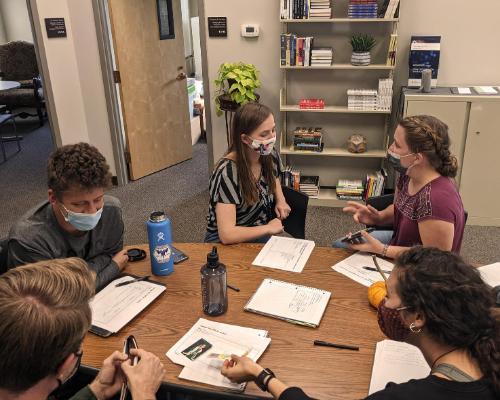
Innovation Scholars gather in the CFI Office
Taylor, Karen, and Johnny settle around the table in the middle of the room, pulling out their laptops and notes. This week they’re debriefing interviews they conducted with leading executives across a range of sectors from technology to healthcare, and brainstorming how to use this data to create workshops that would benefit these executives and their employees.
Taylor reflects that having multiple disciplinary perspectives on the team enriches conversations like these. She studies Economics, and Karen majors in Business/Economics. But Johnny double majors in Political Science and Biblical and Theological Studies, which provides unique texture to their team conversations.
Taylor explained, “Something that would stand out to me in a conversation is different than a takeaway that Johnny would have from an interview we’ve conducted together. As we’ve synthesized all the information from these interviews, we’ve made these giant mindmaps that keep building off previous points. There is so much that each of us introduce because of our different disciplines.”
As Karen put it, “Our team is strengthened with different perspectives.”
The Difference
These students are intuiting something foundational to the iLab model: the idea that diverse teams outperform homogenous teams. This insight is articulated, amongst other places, in social scientist Scott Page’s book The Difference, which CFI Managing Director Ben Norquist cites as contributing to the iLab’s vision of diversity.
A richly researched and data-driven book, The Difference recounts various studies, including one in which a team of experientially and vocationally diverse individuals outperformed a team composed of top performers. “Diversity trumps ability,” at least when it comes to solving complex problems (Page 137).
“Put simply,” Ben explained, “cross-functional and interdisciplinary teams solve problems better, at least in part because they have to process information more carefully than homogenous teams. They come up with better solutions. Bottom line.”
For those in the Wheaton community, this insight is familiar, because the same line of reasoning, writ individual, is at the heart of a Wheaton liberal arts education. Diverse sets of experiences and classes that challenge across disciplines are what give texture to a Wheaton education. In fact, every time Taylor, Karen, and Johnny enter the iLab for their weekly meetings, they pass the Interdisciplinary Studies (IDS) office, a reminder that Wheaton has long been applying interdisciplinary insights to academics.
So if it’s true that, say, Taylor Rudin’s ability to contribute to her team is strengthened if she has received a liberal arts education, and if it’s true that a team is strengthened by a diverse set of individuals, then interdisciplinary teams of liberal arts students are among the most powerful problem-solving resources out there.
Asking the Right Questions
Let’s imagine one last project. This one takes place in the future.
Lance Clevinger, a 2011 Wheaton alumnus, joins the Zoom call from his living room in North Carolina. Lance is a familiar face to the CFI community, as a CFI Founding Member and now as one of fourteen iLab Coaches that regularly share their marketplace expertise with the iLab. On this call, however, Lance shares how he’ll engage the iLab next semester for his startup, Legacy Left.
Legacy Left is a service organization founded on the principle of treating wisdom as an asset. Their solutions range from professionally guided sessions to a future app that aims to prompt people to respond to strategic short questions, helping them articulate the wisdom accumulated throughout life. It was borne from the idea that while there is an entire industry built around protecting and distributing financial assets at the end of life, the wisdom accrued through a lifetime of experience is currently treated with less intentionality.
As Lance explained, the driving desire of Legacy Left is helping people “form a habit around building a legacy.”
But how do you create a legacy? The answer is not simple. It requires insights from psychology, philosophy, communication, business, and technology, to name a few. Enter the CFI iLab.
Lance’s passion for the iLab and Legacy Left are evident in his voice as he shares about next semester’s iLab project potential. Starting in January, students across four disciplines will deliver a set of researched and focus group-tested questions that, one memory at a time, uncover the riches of one’s legacy. The philosophy student’s group will start, said Lance, asking, “What are the big questions that go into forming one’s legacy?” The psychology team will then break down these questions into manageable, engaging prompts, while the business team will brainstorm how to brand the app. The fourth student will serve as Team Lead, strategically supporting each group and facilitating the success of the project overall.
Lance shared that he will never forget this insight from his Rhetoric & Culture class at Wheaton: that Jesus often asked people questions, “which was always more powerful than just telling them the answers,” said Lance. “What kind of questions can we ask that would challenge people to really admit things to themselves, that could potentially open up opportunities for the gospel?”
Innovating to Bless the World
The gospel-centered design at the heart of Legacy Left is also at the heart of the CFI iLab. Though CFI welcomes projects both with and without expressly Christian missions, each project team writes three prayers that “serve as guiding documents for the projects,” Ben shared. While students are conducting interviews, analyzing data, and meeting as a team, they’re referring to these prayers, letting prayerful thought and missional focus shape the contours of the project.
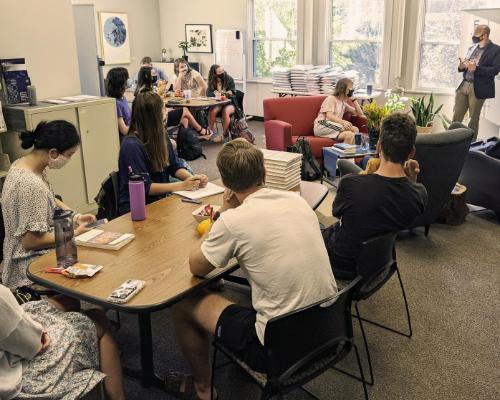
Innovation Scholars hear from Dr. Keith Johnson, Professor of Theology at Wheaton College and Director of Theological Integration at CFI.
There’s a relationship between prayer, mission, innovation, and the liberal arts that the iLab uniquely taps into.
“As Christians,” said Ben, “our innovating is not primarily for our own enrichment. In our world, there are different scripts about what innovation is for. Right now, there’s a brutal, dog-eat-dog, Silicon Valley-driven script. But I think Scripture calls us to a different way of thinking about innovation: as an opportunity to discover new and better ways to bless our neighbors, and to bless the world.”
How do we write this kingdom-saturated script? Better yet, how do we live it, and how do we let it shape our world? The iLab offers a response: through Christian community and critical thinking. Through asking innovative questions like, “What is life’s true asset: money, or wisdom?” Through letting prayers be the guiding documents of our work, and through gathering with those who think in ways we don’t.
Works Cited
Scott Page. The Difference: How the Power of Diversity Creates Better Groups, Firms, Schools, and Society. Princeton: Princeton University Press, 2007.
Cross-functional and interdisciplinary teams solve problems better, at least in part because they have to process information more carefully than homogenous teams. They come up with better solutions. Bottom line.
